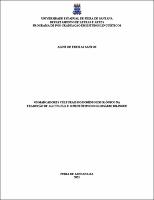| Compartilhamento |


|
Use este identificador para citar ou linkar para este item:
http://tede2.uefs.br:8080/handle/tede/1470| Tipo do documento: | Dissertação |
| Título: | Os marcadores culturais do domínio ideológico na tradução de macunaíma e o protótipo do glossário bilingue |
| Autor: | Santos, Aline de Freitas  |
| Primeiro orientador: | Barreiros, Patrício Nunes |
| Resumo: | Neste trabalho apresentamos um estudo dos marcadores culturais baseado em corpus paralelo constituído pela rapsódia Macunaíma: um herói sem nenhum caráter em Língua Portuguesa e pela sua tradução para Língua Espanhola realizada pelo escritor mexicano Hector Olea. O objetivo que conduz esta pesquisa é observar como as unidades lexicais que denomimamos Marcadores Culturais (MC’s), segundo a definição de Aubert (2006), são tratadas na tradução, levando em conta as estratégias discursivas e retóricas detectadas. Assim, nesta pesquisa, identificamos e analisamos, com o auxílio do programa WordSmith Tools 7.0, os Marcadores Culturais correspondentes ao domínio ideológico, refletindo, então, sobre as decisões empregadas pelo tradutor e as marcas da decolonialidade deixadas em sua produção. Como resultado, apresentamos reflexões sobre a tradução cultural do Brasil realizada por Mário de Andrade em Macunaíma, inventariamos uma lista com 30 MC’s representativos do folclore brasileiro e seus respectivos correspondentes em espanhol, pontuamos características da tradução da rapsódia realizada por Hector Olea, assim como construímos o protótipo do Glossário Bilíngue online de Marcadores Culturais (http://www.glossariomacunaima.com/) e um modelo de verbete específico para o registro das lexias analisadas nesta pesquisa. O trabalho é de caratér bibliográfico, interdisciplinar e situa-se no campo de estudos dos Marcadores Culturais (AUBERT, 2006; AIXELÁ, 2013; REICHMANN & ZAVAGLIA, 2014), dos Domínios Culturais (NIDA, 1945; AUBERT, 1981;2006), das Teorias da tradução (VENNUTI, 1995; 2019; AUBERT, 1995; COSTA, 2005), da Linguística de corpus (BAKER, 1998; BERBER SARDINHA, 2000), da Lexicografia Bilíngue (ZAVAGLIA, 2005; 2006; ZAVAGLIA & ZAVAGLIA, 2000; DURAN & XATARA, 2008) e da Lexicografia Computacional (ESCOBAR, 2006). |
| Abstract: | In this work we present a study of cultural markers based on a parallel corpus constituted by the rhapsody Macunaíma: um herói sem nenhum caráter in portuguese and for its translation into spanish by the Mexican writer Hector Olea. The objective of this research is to observe how the lexical units that we call Cultural Markers (MC’s), according to the definition of Aubert (2006), are treated in translation, taking into account the discursive and rhetorical strategies detected. Thus, in this research, we identified and analyzed, with the aid of the WordSmith Tools 7.0 program, the Cultural Markers corresponding to the ideological domain, reflecting, then, on the decisions made by the translator and the marks of decoloniality left in his production. As a result, we present reflections on the cultural translation of Brazil carried out by Mário de Andrade in Macunaíma, invented a list with 30 MC's representative of Brazilian folklore and their respective correspondents in Spanish, we pointed out characteristics of the translation of the rhapsody performed by Hector Olea, as well as we constructed the prototype of the online Bilingual Glossary of Cultural Markers (http://www.glossariomacunaima.com/ ) and a specific entry model for the registration of the lexias analyzed in this research. The work is bibliographic, interdisciplinary and is located in the field of Cultural Markers studies (AUBERT, 2006; AIXELÁ, 2013; REICHMANN & ZAVAGLIA, 2014), Cultural Domains (NIDA, 1945; AUBERT, 1981; 2006), Translation Theories (VENNUTI, 1995; 2019; AUBERT, 1995; COSTA, 2005), Corpus Linguistics (BAKER, 1998; BERBER SARDINHA, 2000), Bilingual Lexicography (ZAVAGLIA, 2005; 2006; ZAVAGLIA & ZAVAGLIA, 2000 ; DURAN & XATARA, 2008) and Computational Lexicography (ESCOBAR, 2006). |
| Palavras-chave: | Marcadores culturais Macunaíma Tradução Espanhol Glossário bilíngue Cultural markers Macunaíma Translation Spanish Bilingual glossary |
| Área(s) do CNPq: | LINGUISTICA, LETRAS E ARTES LINGUISTICA, LETRAS E ARTES::LINGUISTICA LETRAS::LITERATURA BRASILEIRA |
| Idioma: | por |
| País: | Brasil |
| Instituição: | Universidade Estadual de Feira de Santana |
| Sigla da instituição: | UEFS |
| Departamento: | DEPARTAMENTO DE LETRAS E ARTES |
| Programa: | Mestrado Acadêmico em Estudos Linguísticos |
| Citação: | SANTOS, Aline de Freitas. Os marcadores culturais do domínio ideológico na tradução de macunaíma e o protótipo do glossário bilingue, 2021, 191 f. Dissertação (Mestrado Acadêmico em Estudos Linguísticos) - Universidade Estadual de Feira de Santana, Feira de Santana, 2021. |
| Tipo de acesso: | Acesso Aberto |
| URI: | http://tede2.uefs.br:8080/handle/tede/1470 |
| Data de defesa: | 19-Fev-2021 |
| Aparece nas coleções: | Coleção UEFS |
Arquivos associados a este item:
| Arquivo | Descrição | Tamanho | Formato | |
|---|---|---|---|---|
| Versao_final_da_dissertacao_para_defesa__Aline_de_Freitas_Santos__Entrega___2_.pdf | SANTOS2021_DISSERTAÇÃO_PPGEL | 2,37 MB | Adobe PDF |  Baixar/Abrir Pré-Visualizar |
Os itens no repositório estão protegidos por copyright, com todos os direitos reservados, salvo quando é indicado o contrário.




